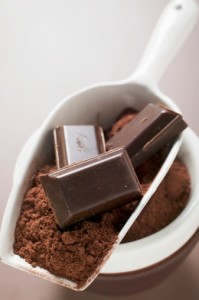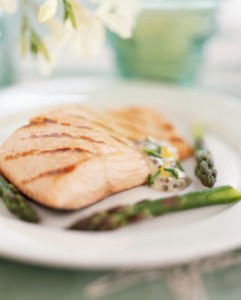Eight Foods to Boost Your Mood and Not Your Weight
By Anthony Heredia | May 2nd, 2011 | Category: Fitness Couture, Nutrition | 1 Comment » Do you ever have those days where you just don’t feel right, happy, or positive, so you start to justify an oh so unhealthy comfort food binge for yourself? Sure, you know you can reach for that high calorie desert or milk chocolate treat for an instant kick of happy, but you also know the guilt that will soon follow, along with the energy and mood drop again. The primary reason food has such power over our mood is because of chemical reactions, hormones, and enzymes busy at work. When food breaks down in our bodies, it triggers various hormones to make us happy, sleepy, energetic, and so many other feelings that will vary depending on the food we ate and its quality. Our bodies begin to create this chemical cocktail to extract as many nutrients as possible to keep you running. This becomes relevant because the quality and nutrient levels of the food will directly affect your mood. Nutrients should enter your bloodstream at an even pace; but if you were to overwhelm it or overwork it, it will have to adapt. An example is a large fast food meal slowing you down and destroying your energy since your body is having trouble processing it. Just as with any car, you cannot dump rubbing alcohol into the gas tank and expect the car to perform like a champ. If you want to feel better, you need to use better fuel but there is a way for you to enjoy your treats as well, so don’t despair.
Do you ever have those days where you just don’t feel right, happy, or positive, so you start to justify an oh so unhealthy comfort food binge for yourself? Sure, you know you can reach for that high calorie desert or milk chocolate treat for an instant kick of happy, but you also know the guilt that will soon follow, along with the energy and mood drop again. The primary reason food has such power over our mood is because of chemical reactions, hormones, and enzymes busy at work. When food breaks down in our bodies, it triggers various hormones to make us happy, sleepy, energetic, and so many other feelings that will vary depending on the food we ate and its quality. Our bodies begin to create this chemical cocktail to extract as many nutrients as possible to keep you running. This becomes relevant because the quality and nutrient levels of the food will directly affect your mood. Nutrients should enter your bloodstream at an even pace; but if you were to overwhelm it or overwork it, it will have to adapt. An example is a large fast food meal slowing you down and destroying your energy since your body is having trouble processing it. Just as with any car, you cannot dump rubbing alcohol into the gas tank and expect the car to perform like a champ. If you want to feel better, you need to use better fuel but there is a way for you to enjoy your treats as well, so don’t despair.
Dealing with Unhealthy High Calorie Comfort Food
We look to comfort food to console us, for the emotional connections we have grown over our lives. The term “comfort food” was first used in 1977 and simply referred to food that brings us comforting thoughts, feel good food. Typically, these foods are high in carbohydrates which boost serotonin levels (a hormone that calms us) and endorphins (feel good hormones). Healthy baked yams might turn one person’s frown upside down while the next person will need a sugary bowl of ice cream to budge that same frown. Comfort food is different for everyone. We all have different relationships with food, but we can make it a healthy, balanced relationship. Most believe that avoiding bad food is a game of will power, but they would be wrong. In actuality there is a chemical war inside you, and will power is just a tiny soldier. When we imagine the smells and flavors of our favorite foods, a very real cascade of chemical reactions sends our body scavenging for those foods to chemically and emotionally satisfy our palates. The strong hormones overpower you and your will power will often be out gunned; it’s a chemical thing. If this sounds like you—and sugary or high calorie foods torment your emotionally compromised days—fret no more. The answer lies in tricking your body, just a little bit. What you are truly craving to lift your spirits is the flavor of your favorite food, not the guilt-riddling high volume of the belt busting food. The plan is to first fill yourself on a healthy low calorie, but high volume food (i.e., broth based soup, a large salad, veggies, high fiber food, etc.) and then enjoy a reasonable amount of your comforting treat. This way you don’t have the opportunity to sabotage your waistline and mood with a bad day binge. A life of deprivation is no life at all, so don’t deny yourself your favorite foods, but enjoy the flavor of a small amount of your treat rather than a mountain of guilt. Below is a list of the top eight foods you should incorporate into your daily meals for mood enhancing nutrition.
Healthy Mood Boosting Power Foods
1. Dark Chocolate
Top of our list is the most notorious of all comfort foods, chocolate. Take note, though, that we are recommending dark chocolate to tame your craving. Ensure your chocolaty choice has 70% cocoa or above to reap the infamous benefits of its antioxidants and phenylalanine. Recent studies are showing phenylalanine to fight depression aggressively by increasing the production of serotonin (calming) and dopamine (happiness) in the brain.
2. Caffeine
This natural stimulant is typically the second choice for mood enhancement and is actually found naturally in our first choice, chocolate. Caffeine should be kept for mornings or afternoon options mostly as it can keep you up all night. Your morning cup of espresso/coffee will not only lift your spirits but also boost your immune system with its antioxidants. One caveat: keep your daily intake below 3 cups of coffee daily to avoid mood swings.
3. Turkey
This cut of meat makes the list for its high levels of protein, mood enhancing tryptophan, and it just so happens to be naturally low in fat. Tryptophan is vital to producing the mood boosting serotonin and niacin but is more famously known for its mild sedative properties, aiding in rest.
Although bananas can get high in calories, they are jam-packed with goodness. You will find vitamin B6, which is a vital neurotransmitter (helps the body communicate with itself), energy promoting potassium, and mood enhancing magnesium. Spreading some light peanut or almond butter on a banana for breakfast or tossing one in a morning shake will power up your morning.
5. Spinach
Rich in folate and iron, studies have shown this mean green leafy machine to be a great contender for depression. Folate helps make DNA, RNA, and the rapid division of cells to keep your body up to speed.
6. Walnuts
Walnuts are best known for their high levels of serotonin supporting omega-3 and magnesium, which stabilizes blood sugar fantastically. This antioxidant powered nut fights hunger, depression, insomnia, and stress.
7. Salmon
Salmon joins the ranks of good mood food due to its rich levels of omega-3 fatty acids and vitamin D, which you need to use our next food properly, calcium. Both omega-3 and vitamin D are neurotransmitters. This means they help the body transmit instructions within your body.
8. Milk (Dairy)
Milk is rich in calcium and also the amino acid tryptophan. Just like turkey, it will help counteract stress, promote rest, calm nerves, and elevate mood by aiding the body’s quest for balance.
1. Hasler, G., Van der Veen, J.W., Tumonis, T., Meyers, N., Shen, J. & Drevets, W.C. (2007) Reduced Prefrontal Glutamate/Glutamine and -Aminobutyric Acid Levels in Major Depression Determined Using Proton Magnetic Resonance Spectroscopy Archives of General Psychiatry, Volume 64, issue 2, (pp. 193-200)
2. Wansink, Brian and Cynthia Sangerman (2000). “Engineering Comfort” (PDF). Retrieved 2010-09-23. http://foodpsychology.cornell.edu/
3. Wolfe, B.E., Metzger, E.D., & Stollar, C. (1997). The effects of dieting on plasma tryptophan concentration and food intake in healthy women. Physiology and Behaviour, 61, 537-541
4. American Psychological Association (APA): comfort food. (n.d.). Dictionary.com Unabridged. Retrieved March 30, 2011, from Dictionary.com website: http://dictionary.reference.com/browse/comfort food










I was very pleased to find this site. I wanted to thank for your time for this wonderful WEBSITE!! I definitely enjoy every article you got.